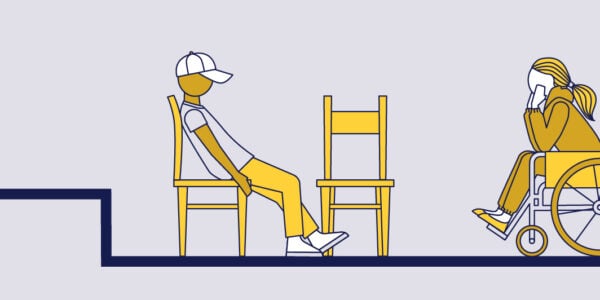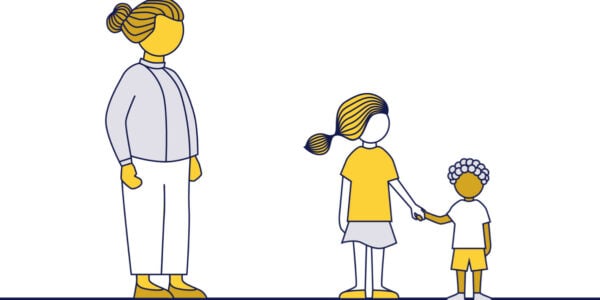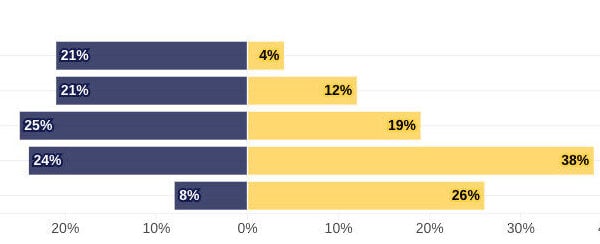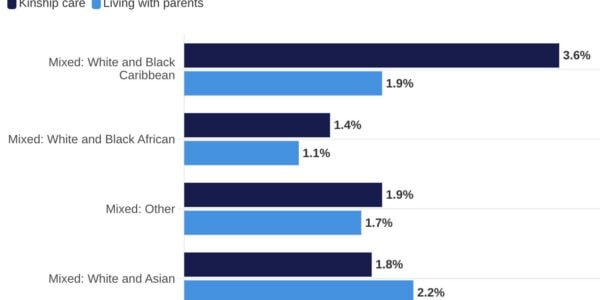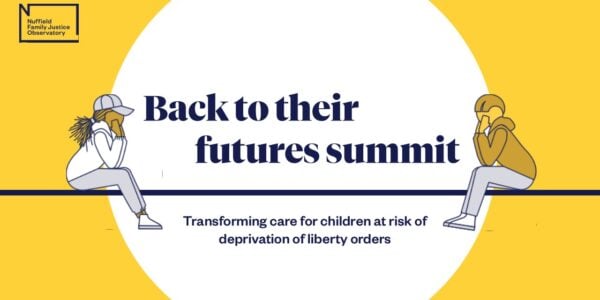About
This summary highlights the main findings of a report that provides an overview of health-based vulnerabilities experienced by mothers and fathers of children aged 0–17 across a two-year period prior to their involvement in section 31 care proceedings in Wales. The report was written by the Family Justice Data Partnership—a collaboration between Lancaster University and Swansea University.
Nuffield FJO has funded this project, but the views expressed are those of the authors and not necessarily those of Nuffield FJO or the Foundation.
This is a summary of the first population-based study to link a cohort of parents— both mothers and fathers—of children involved in section 31 care proceedings to health records in Wales. It provides an overview of health service use and health needs of parents during a two-year period prior to court proceedings. The study uncovers the range of parents’ health vulnerabilities and higher use of both routine and emergency healthcare when compared to a matched comparison group.
Findings for cohort mothers and fathers were notably similar—parents were more likely to experience poor mental health, substance use and injury-related conditions compared to a comparison group of parents not involved in care proceedings.
Introduction
The Family Justice Data Partnership (FJDP) provided analyses of infants and newborn babies subject to care proceedings in Wales under section 31 (s.31) of the Children Act 1989 (2019) (Alrouh et al. 2019).1 The report revealed the scale and rising number of families involved in such proceedings and recommended the need for preventative action. Building on this work, the FJDP further examined characteristics of mothers of infants involved in care proceedings, including mental health needs (L. J. Grifths et al. 2020a; L.J. Griffiths et al. 2020b; Griffiths et al. 2021). The report on which this summary is based extends this work by examining a broader range of parental vulnerabilities for both mothers and fathers of children of any age involved in care proceedings.
Appropriate and effective health and social support are required to help alleviate some of the need for care proceedings. However, a joined-up health and children’s social care response to parents requires far greater knowledge about their healthcare needs and their interaction with health and social care services. This study provides completely new evidence, which will enable services to be tailored more effectively.
Combinations of domestic violence, parental mental health issues and/or learning disability, and parental alcohol and/or drug misuse, have received considerable attention in relation to risk of child abuse and neglect (Brandon 2009; Hood et al. 2020). Skinner and colleagues have recently called for a better understanding of the wider factors impacting families involved with child protection services (Skinner et al. 2021). More comprehensive evidence of health needs and vulnerabilities, including more in-depth exploration of specific health conditions of parents entering care proceedings and their use of different types of healthcare provision—routine and emergency—will also enable enhanced response from the family courts and other services.
This is the first time that population-level data collected routinely by Cafcass Cymru for mothers and fathers has been linked to health records for research.2 Preliminary findings are reported here, setting the scene for more in-depth analyses that will enable greater insight into family circumstances and impacts on parents and children involved in s.31 care proceedings.
Key findings
Both mothers and fathers in care proceedings in Wales experienced greater levels of health vulnerabilities during the two-year period prior to court proceedings compared to a comparison group of parents matched on deprivation, sex, and age. The higher use of emergency healthcare is particularly noteworthy and indicates considerable crisis health need among parents. Elevated mental health, substance use, and injury-related conditions are coupled with higher use of emergency services. Better understanding of the needs and vulnerabilities of this population, including the reasons why parents are making greater use of emergency healthcare may provide opportunities to improve a range of support and preventative interventions that respond to crises in the community.
What are ‘care proceedings’?
Care proceedings are issued under section 31 (s.31) of the Children Act 1989 and can lead to removal of a child from parents’ care on account of actual or likely significant harm.
About the data
This study used anonymised administrative data supplied by Cafcass Cymru, combined with health data within the SAIL Databank, a highly secure, trusted research environment.
Study cohort
The study included a cohort of parents entering care proceedings between 2011 and 2019. We analysed data available for 8,821 parents (57% mothers, 43% fathers) in the two-year period prior to proceedings. Findings were compared to a matched comparison group selected from parents in the general population of Wales with similar demographic characteristics, and who were not subject to care proceedings (32,006 parents).
- Nearly half of cohort parents lived in the most deprived areas of Wales, reiterating established links between deprivation and involvement in care proceedings.
- Cohort parents had higher levels of healthcare use across multiple healthcare settings.
- Differences in healthcare use were more pronounced for unplanned or emergency care.
- Within the cohort, 34% of mothers, and 19% of fathers had emergency hospital admissions, compared to 15% and 8% for comparison group mothers and fathers.
- 63% of mothers, and 55% of fathers in the cohort had emergency department attendances, compared to 37% for both comparison mothers and fathers.
- Health conditions with the widest variation between cohort and comparison groups were related to mental health, substance use, and injuries.
- Common mental health conditions (Figure 1) were around three times as likely in cohort parents, depression being the most likely condition (44% mothers, 24% fathers).
- Cohort parents were nine times more likely to have a less common severe mental health illness recorded (including schizophrenia).
- Around one in fve cohort parents had substance use-related conditions (19%), much higher than parents in the comparison group (2%).
- Cohort parents were more likely to experience assault, or self-harm related emergency attendances (12 and 7 times more likely than comparisons respectively) (Figure 2).
Figure 1: Percentage of individuals with common mental health conditions and substance use disorders (combined hospital admissions and GP measure)
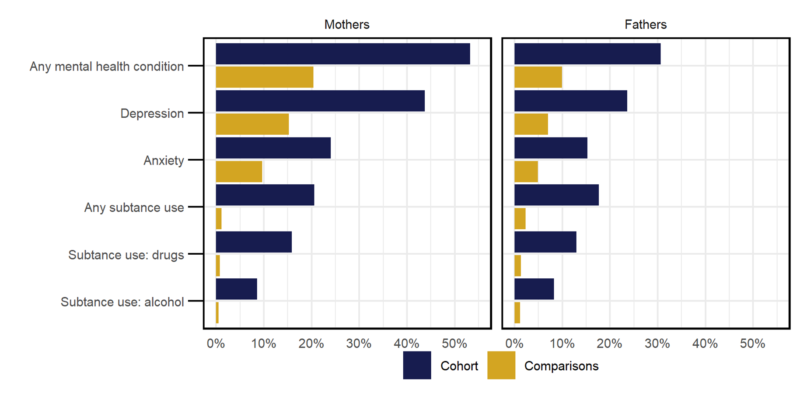
Figure 2: Percentage of individuals with injury-related emergency department attendances by attendance group category
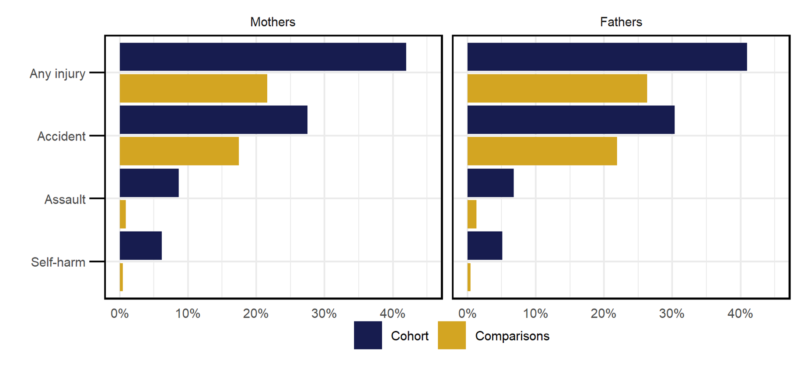
Methods, limitations and future work
The study included a cohort of parents entering care proceedings between 2011 and 2019. We analysed data available for 8,821 parents (57% mothers, 43% fathers) in the two-year period prior to proceedings. Findings were compared to a matched comparison group selected from parents in the general population of Wales with similar demographic characteristics, and who were not subject to care proceedings (32,006 parents).
Analysis was completed in the Secure Anonymised Information Linkage (SAIL) Databank (Ford et al. 2009; Lyons et al. 2009; Jones et al. 2017, 2020) using linked Cafcass Cymru and data from:
- Welsh Demographic Service Dataset
- Welsh Index of Multiple Deprivation
- Patient Episode Database for Wales (hospital admissions)
- Emergency Department Dataset for Wales (accident and emergency attendances)
- Welsh Longitudinal General Practice (general practice interactions)
- Outpatient Dataset for Wales (hospital outpatient appointments).
We analysed healthcare use and health conditions in multiple healthcare settings, then further investigated specific conditions. Measures were calculated as the total number of people with at least one of the health events during the period.
Due to the wide scope of these analyses, we recommend that further work (by FJDP or others) should consider limitations noted in the main report, and a multitude of factors including protected characteristics (for example, race, age, sex) and heritage to provide more detailed insight. Consideration of the period during and beyond involvement in care proceedings should also be investigated. In addition, the impact of these parental health vulnerabilities on the children and young people involved should also be explored.
Implications
These findings highlight the heightened socioeconomic and health vulnerabilities experienced by both mothers and fathers when compared with a comparison group matched on deprivation, sex, and age.
The higher use of emergency healthcare is particularly noteworthy and indicates considerable crisis health need among parents. Elevated mental health, substance use, and injury-related conditions are coupled with higher use of emergency services. Better understanding of the needs and vulnerabilities of this population, including the reasons why parents are making greater use of emergency healthcare, may provide opportunities to improve a range of support and preventative interventions that respond to crises in the community.
References
Alrouh, B., Broadhurst K., Cusworth, L., Griffiths L.J., Johnson, R.D., Akbari, A., et al.. (2019). Born into care Wales: Newborns and infants in care proceedings in Wales. Available from: https://www.nuffieldfjo.org.uk/event/born-into-care-wales-newborns-and-infants-in-care-proceedings-in-wales
Ford, D., Jones, K., Verplancke, J., Lyons, L., John, G., Brown, G. et al. (2009). The SAIL Databank: building a national architecture for e-health research and evaluation, BMC Health Services Research, 9(1), p. 157.
Griffiths, L.J., Johnson, R.D., Broadhurst, K., Bedston, S., Cusworth, L., Alrouh, B. et al. (2020a). Born into care: One thousand mothers in care proceedings in Wales. Available from: https://www.nuffieldfjo.org.uk/resource/1000-mothers-care-proceedings-wales
Griffiths, L.J., Johnson, R.D., Broadhurst, K., and John, A. (2020b). Maternal health, pregnancy and birth outcomes for women involved in care proceedings in Wales: a linked data study, BMC Pregnancy and Childbirth. BioMed Central Ltd, 20(1), p. 697. doi: 10.1186/s12884-020-03370-4
Griffiths, L.J., Johnson, R.D., Broadhurst, K., Cusworth, L., Bedston, S., Akbari, A. et al. (2021). Born into care: One thousand mothers in care proceedings in Wales, A focus on maternal mental health. Available from: https://www.nuffieldfjo.org.uk/resource/born-into-care-maternal-mental-health
Jones, K.H., Laurie, G., Stevens, L., Dobbs, C., Ford, D.V., and Lea, N. (2017). The other side of the coin: Harm due to the non-use of health-related data, International journal of medical informatics. Elsevier, 97, pp. 43–51. doi: 10.1016/j.ijmedinf.2016.09.010.
Jones, K.H., Ford, D.V., Thompson, S., and Lyons, R. (2020). A profile of the SAIL Databank on the UK Secure Research Platform’, International Journal of Population Data Science, 4(2). doi: 10.23889/ijpds.v4i2.1134
Lyons, R.A., Jones, K.H., John, G., Brooks, C.J., Verplancke, J., Ford, D.V., et al. (2009). The SAIL databank: linking multiple health and social care datasets, BMC Medical Informatics and Decision Making. BioMed Central, 9(1), p. 3. doi: 10.1186/1472-6947-9-3
1 Care proceedings can result in interim or permanent removal of a baby from parents’ care. At the close of care proceedings, infants may return to birth parents, or be placed with alternative carers or for adoption. If a local authority intends to remove a child from his or her parents’ care or assume parental responsibility, the local authority must apply for a care order. Care orders are applied for and authorised by the family courts under s.31 of the Children Act 1989.
2 Cafcass Cymru is a Welsh government organisation that represents children’s best interests in family justice proceedings in Wales.
This report was written in partnership with
-
 Lancaster University
Lancaster University -
 Family Justice Data Partnership
Family Justice Data Partnership -
 The Centre for Child and Family Justice Research
The Centre for Child and Family Justice Research -
 Population Data Science at Swansea University
Population Data Science at Swansea University -
 SAIL Databank
SAIL Databank -
 Adolescent Mental Health Data Platform
Adolescent Mental Health Data Platform -
 Swansea University Medical School
Swansea University Medical School








